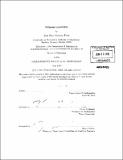Origami manifolds
Author(s)
Pissarra Pires, Ana Rita
DownloadFull printable version (3.970Mb)
Other Contributors
Massachusetts Institute of Technology. Dept. of Mathematics.
Advisor
Victor Guillemin.
Terms of use
Metadata
Show full item recordAbstract
An origami manifold is a manifold equipped with a closed 2-form which is symplectic everywhere except on a hypersurface, where it is a folded form whose kernel defines a circle fibration. In this thesis I explain how an origami manifold can be unfolded into a collection of symplectic pieces and conversely, how a collection of symplectic pieces can be folded (modulo compatibility conditions) into an origami manifold. Using equivariant versions of these operations, I show how classic symplectic results of convexity and classification of toric manifolds translate to the origami world. Several examples are presented, including a complete classification of toric origami surfaces. Furthermore, I extend the results above to the case of nonorientable origami manifolds.
Description
Thesis (Ph. D.)--Massachusetts Institute of Technology, Dept. of Mathematics, 2010. Cataloged from PDF version of thesis. Includes bibliographical references (p. 51).
Date issued
2010Department
Massachusetts Institute of Technology. Department of MathematicsPublisher
Massachusetts Institute of Technology
Keywords
Mathematics.